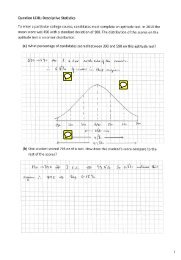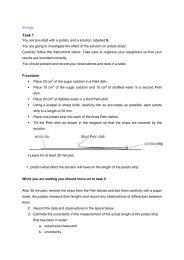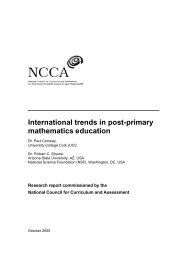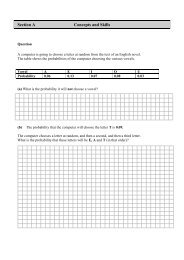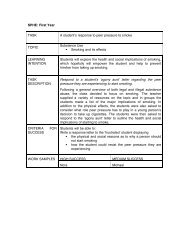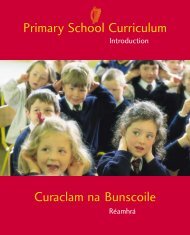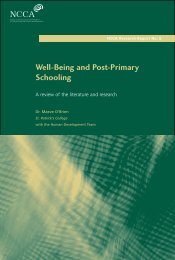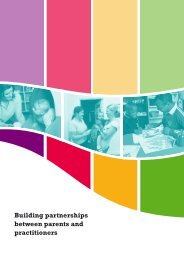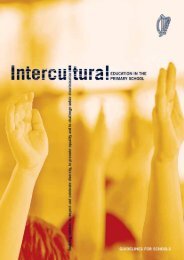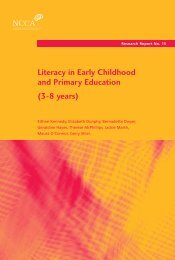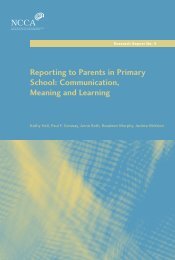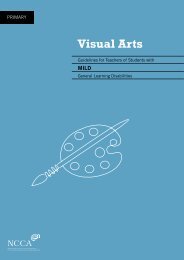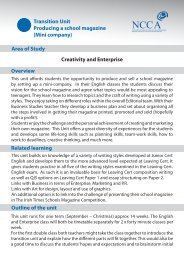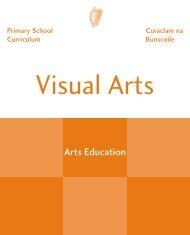Up and Away - National Council for Curriculum and Assessment
Up and Away - National Council for Curriculum and Assessment
Up and Away - National Council for Curriculum and Assessment
Create successful ePaper yourself
Turn your PDF publications into a flip-book with our unique Google optimized e-Paper software.
188<br />
Introduction<br />
This section is intended to provide support <strong>for</strong> pupils who must develop literacy later in the primary cycle.<br />
For pupils who have already developed reading <strong>and</strong> writing skills in another script (e.g. Arabic, Russian,<br />
etc.) the concept of literacy is familiar. However, some pupils, due to difficult circumstances, may have<br />
experienced considerable interruptions to their education <strong>and</strong>, as a consequence, have not successfully<br />
gained literacy in any language. Clearly, the latter situation presents a greater challenge to the language<br />
support teacher.<br />
Teachers working with pupils in this situation sometimes perceive that the teaching of basic literacy skills is<br />
based on a methodology different to their own. This is not the case. The approach <strong>for</strong> developing the basic<br />
literacy skills of newcomer pupils should, there<strong>for</strong>e, mirror that used <strong>for</strong> their classmates in the mainstream.<br />
Speaking precedes writing<br />
The first step is to develop pupils’ oral skills. A bank of oral vocabulary is the basis <strong>for</strong> the subsequent<br />
development of word recognition skills <strong>and</strong> an underst<strong>and</strong>ing of sound-symbol correspondence.<br />
There<strong>for</strong>e, you will find the phonics schemes very useful or a combination of phonics with letter<br />
recognition activities.<br />
As literacy skills develop, pupils are able to record in writing what they are learning in class <strong>and</strong> this study<br />
skill supports further language development.<br />
Integrating the skills<br />
The cycle of learning in the primary classroom starts with oral communication <strong>and</strong> moves towards words<br />
on the page. This integrated approach where speaking supports reading supports writing <strong>for</strong>ms the<br />
underlying dynamic in literacy learning.<br />
Activities to develop literacy skills<br />
The activities in this section highlight an integrated approach. The initial activities are located in two<br />
cycles of learning which contain the following stages:<br />
Stage 1 – Speaking<br />
Stage 2 – Speaking <strong>and</strong> reading<br />
Stage 3 – Towards writing<br />
These stages, although not stated explicitly, are also an identifiable feature of the ‘Model activities’ – see<br />
below.<br />
The activities are <strong>for</strong> use with newcomer pupils at different points in their literacy development.<br />
Cycle 1 (page 189) – Names <strong>and</strong> countries<br />
For pupils with no English <strong>and</strong> very basic literacy needs. These pupils may have no previous experience of<br />
<strong>for</strong>mal schooling.<br />
Cycle 2 (page 210) – What is this?<br />
For pupils with very little English <strong>and</strong> basic literacy needs. These pupils may have some previous<br />
experience of <strong>for</strong>mal schooling <strong>and</strong> may have some existing level of literacy.<br />
Sample activities <strong>for</strong> pupils with A1 level speaking skills (page 215)<br />
The activities can be used to develop a range of literacy needs.



